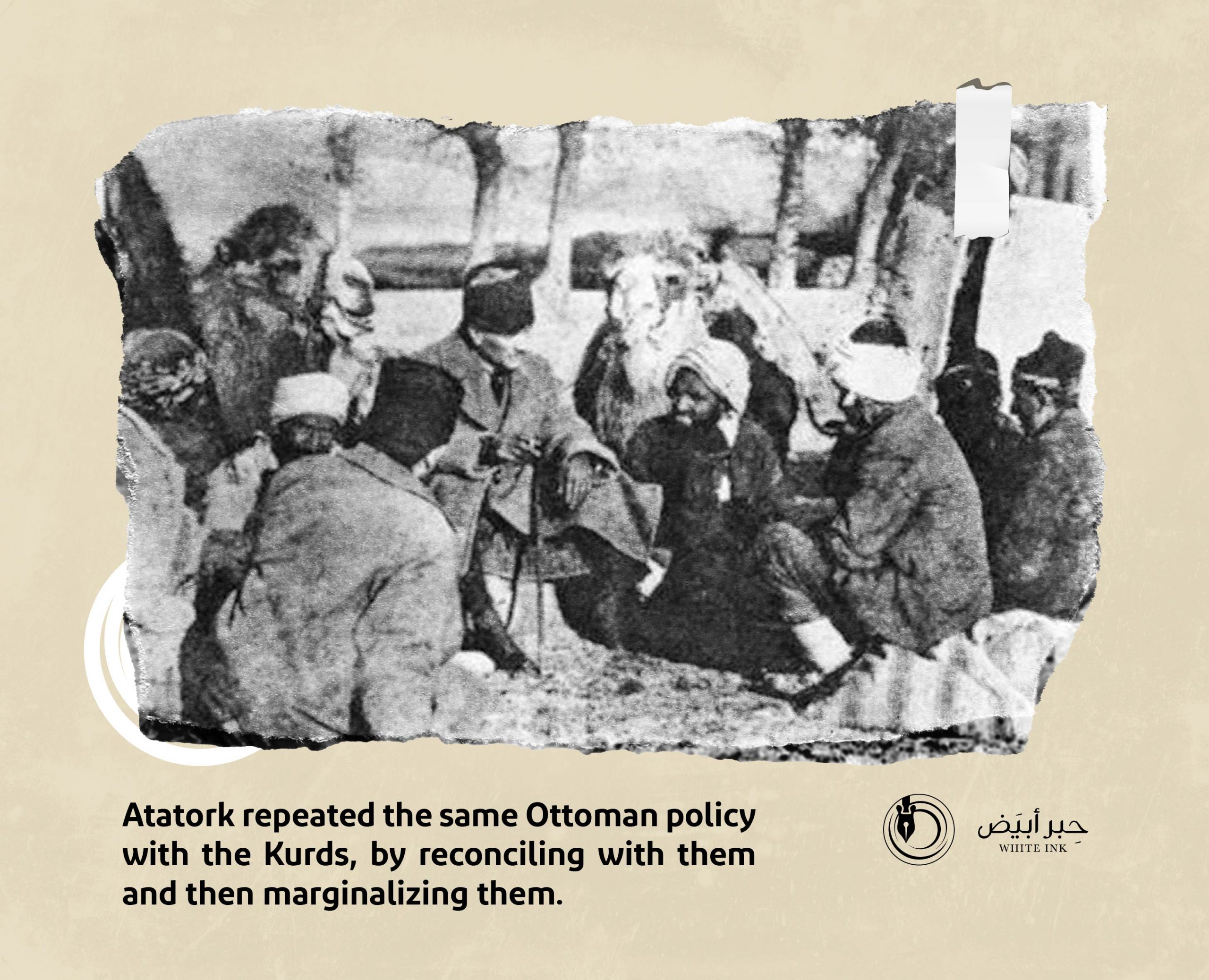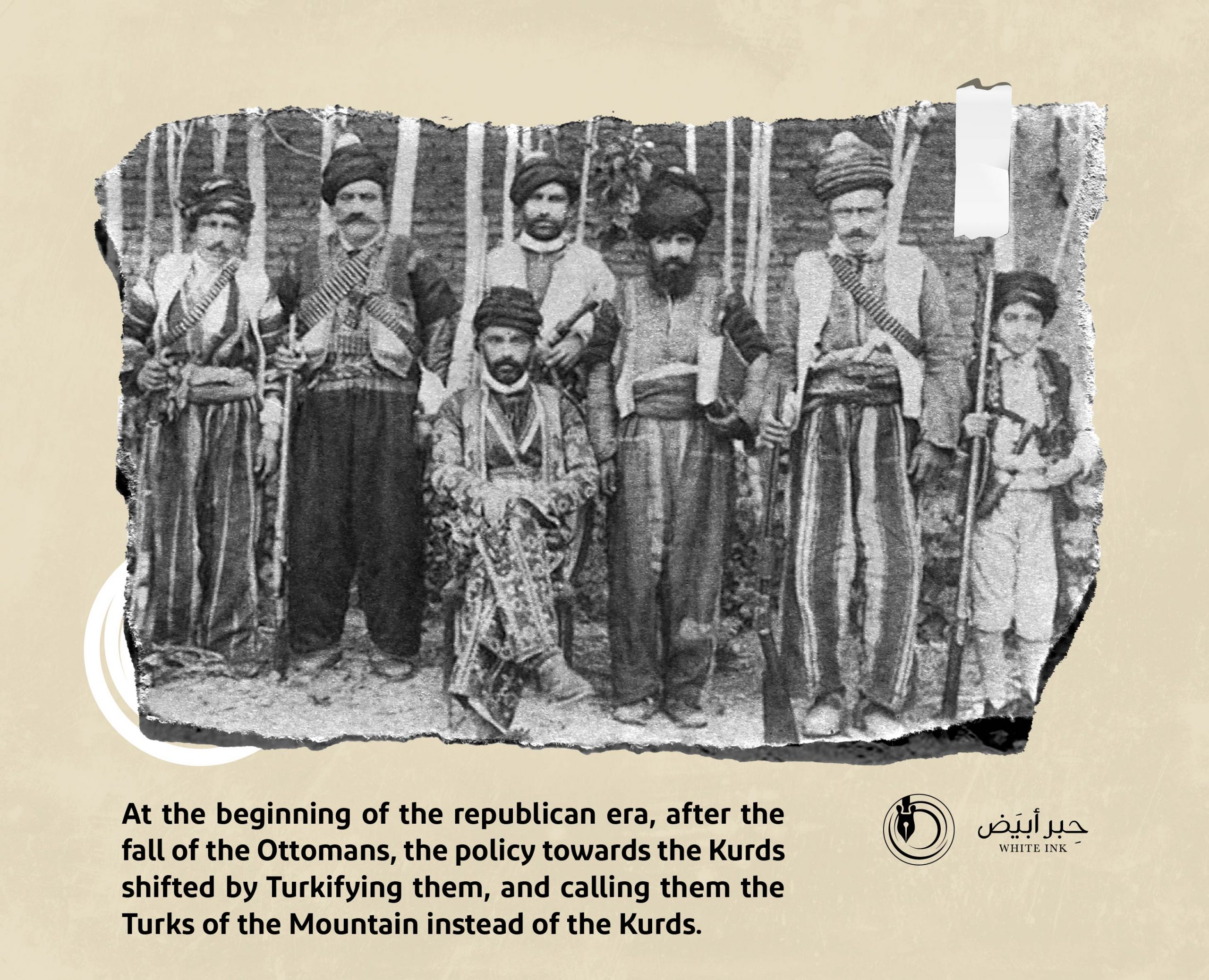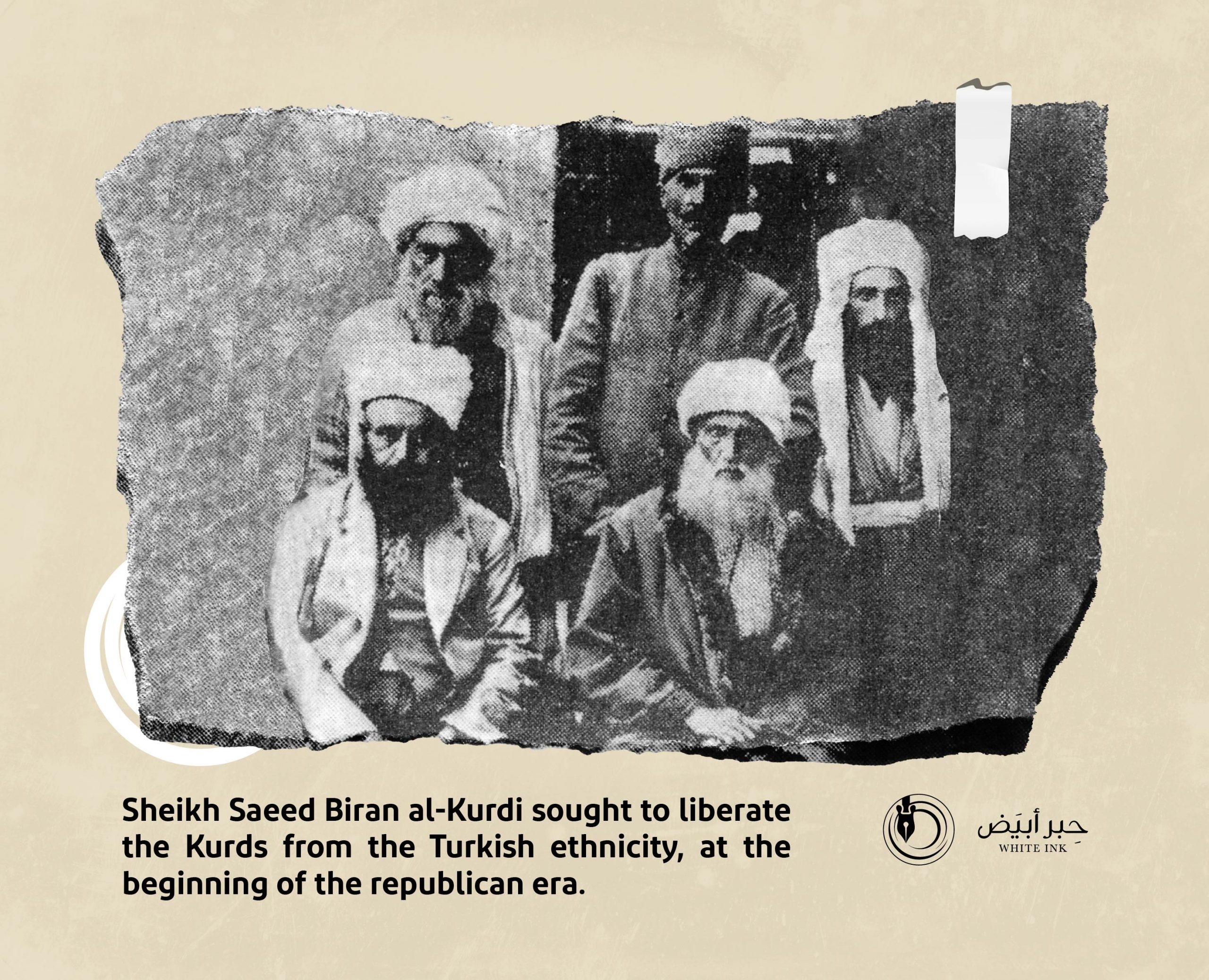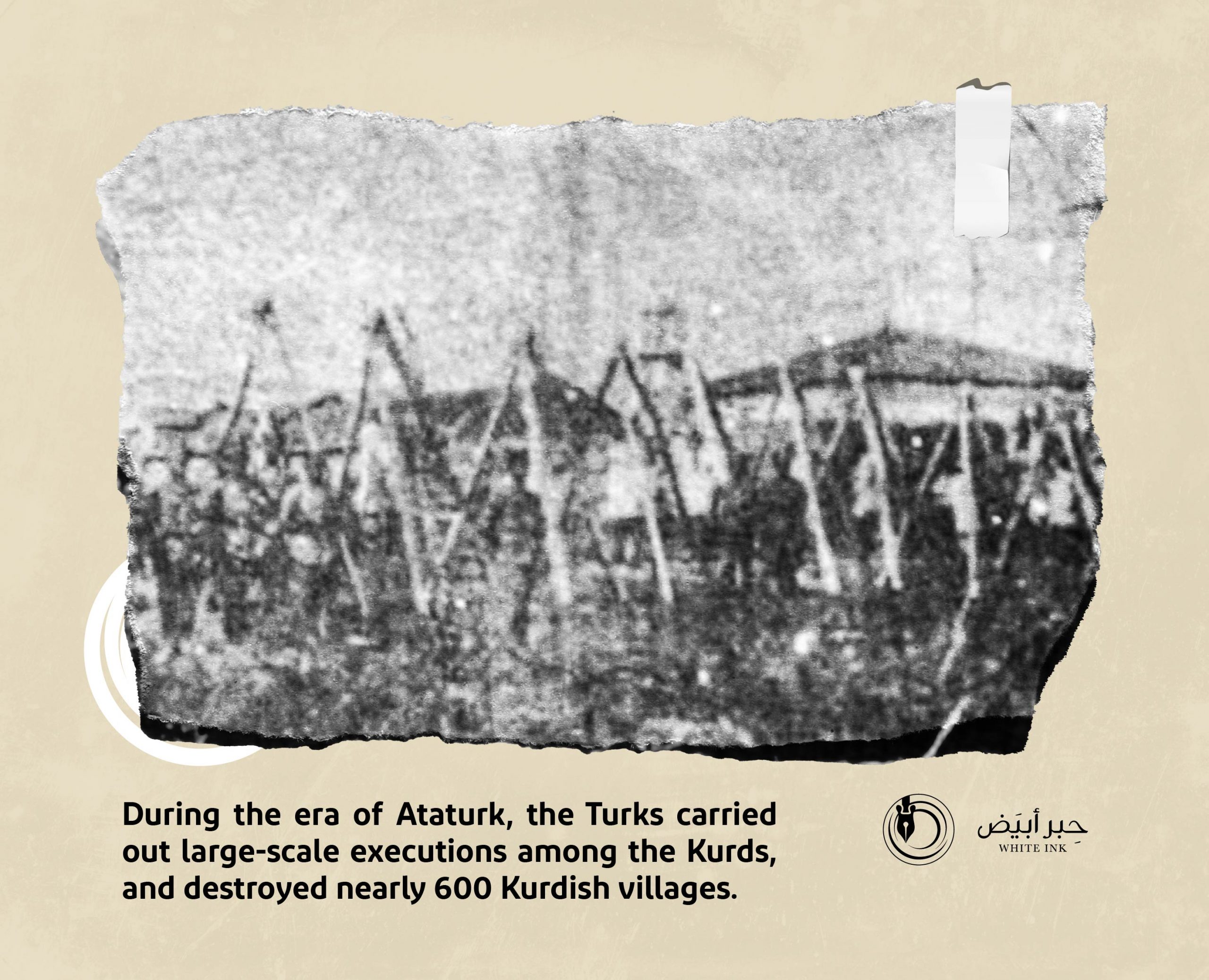
During his reign, both race and tongues were Turkified and Kurdish identity was obliterated
Atatürk applied the principal of (racial assimilation) to the Kurds
Ibn Khaldun says in his introduction: “History is an attempt to scrutinize and justify the existence of beings, and to know facts, and the reasons why it happens. Thus, history is worthy of being a science that informs us about the news and morals of past nations.
Mustafa Kemal Atatürk’s policy towards the Kurds, in its ethnic aversion, constituted an extension of the policy of the Ottoman sultans, through the duality of containment and oppression without the Kurds getting their right to defend the Kurdish identity in its behavioral and functional expressions. Atatürk’s racism constituted a “coup” against the promises Atatürk made to the Kurds to give them the right to choose a better political destiny befitting their demographic weight and their cooperation with the Kemalist regime in the transitional period that preceded and followed the fall of the Ottoman rule in Astana.
The founder of the Turkish Republic eradicated the Kurdish identity by suppressing their language, housing Turks among them, and displacing them from their areas.

The political shrewdness of Atatürk lacked the lessons of history that proved that the security and military approach remained incapable and deficient in securing permanent and concurrent solutions to the Kurdish issue, which required diligence to develop a new political contract with this ethnic component, which extends over four important countries and has background bases through which it moves with all its dynamism and professionalism.
In this regard, Atatürk ‘s policy towards the Kurds remained an extension of hesitant and indecisive policies, given that “the (Turkish) state’s policies – related to the successive governments – were issued from converging perceptions and references, as it did not stop at the possibility of the Kurds’ formation according to the option of secession, federalism or self-management, but it reached their formation within the boundaries of the Turkish Empire, and on its borders.
Atatürk maintained the same ethnic orientation in dealing with the Kurdish Issue, and he didn’t stop there, as he neglected the rights of the Kurdish people by concluding a series of alliances with the West that ended with giving him the green light to abuse the Kurds, but went beyond that to an attempt to erase the ethnic and identity nature of the Kurds by working to Turkify them and push them to abandon their language and change their names as a prelude to annihilating the Kurdish identity and depriving it of any physical or even non-material presence.
The Kemalist orientation took a legal and institutional dimension that was perpetuated in the constitution of 1924 AD, which stipulated that the “exclusive” language of the state is Turkish, before the direction itself took a severe form, especially after the revolution of Sheikh Saeed Biran. Therefore, we find the historian Ahmed Taj al-Din confirming this point by saying: “When the situation in the Kurdish areas worsened, a meeting was held in Astana, chaired by the President of the Republic…After which, several important decisions were taken, most notably: the abolition of clan life and the tribal style the Kurds live, by distributing tribal members among the various Turkish states, the compulsory Turkification of the inhabitants, the complete erasure of Kurdish nationalism, and the prohibition of speaking, reading and writing in the Kurdish language.”
Atatürk continued the eradication process of the Kurdish identity through what was known as the policy of “racial assimilation” through “the suppression of the Kurdish language and the settlement of Turks among the Kurds, and the transfer of some of them to the West.” The results of the two reports were also embodied in the “East Reforms Plan” which was presented to the government in September (1925), which provided special administrative arrangements for the Kurdish regions, which subjects to an inspector general, and the exile of “dangerous” Kurdish families and the exclusion of the Kurds from government service in their hometowns.
For these reasons, Atatürk tried, under the terms of integration, to erase everything related to the Kurdish culture. Things came to the point of calling the Kurds “mountain Turks” as a gesture of neglection and denial of their national presence, in addition to teaching Turkish folklore in schools to perpetuate the reality of Turkification and remove cultural and ethnicity differences at the expense of Kurdish culture.
Atatürk not only he was unsatisfied with these racist measures, but also tried to undermine the Kurdish issue from the inside when he sought to encourage the establishment of “Kurdish” political organizations that owe absolute loyalty to Turkey in order to activate what he called “the policy of denial,” which is intended to deny the existence of a Kurdish people separate from the Turkish nation, which is united by the Turkish language and culture. This direction was legalized in December 1926 when the Ministry of Education issued a decree prohibiting the use of “ethnic” names such as Kurd, Laz or Circassians because such names “damage Turkish unity.”
He fought everything related to the culture, he even called the Kurds "the Turks of the Mountain."

In conclusion, Atatürk failed to contain the Kurds when he insisted on perpetuating the ethnicity of the regime despite the plurality of society. He also established contradictory contractual relations when he subjected the constitution – which is supposed to be a manifestation of democratic practice – to the dictatorship of the army and left the rest of ethnic expressions on the margins of the Turkish political society, which made Turkey Suffers from social and political upheavals, from which Ankara is still suffering its repercussions to-date.


- Ahmed Taj El-Din, Kurdish history of the people and the cause of the homeland, (Cairo: Cultural House for Publishing, 2001).
- Andrew Mango, Ataturk: The Biography of the Founder of Modern Turkey, translated by: Omar Al-Ayoubi (Abu Dhabi: Department of Culture and Tourism “Kalima”, 2018).
- Basile Nikitin: Kurds sociological and historical study, translated by: Nouri Talabani, (Beirut: Dar Al-Saqi, 2017).
- Aida Alali, Kurds in the world – their history and their future (Beirut: Arab House Publishers, 2018).
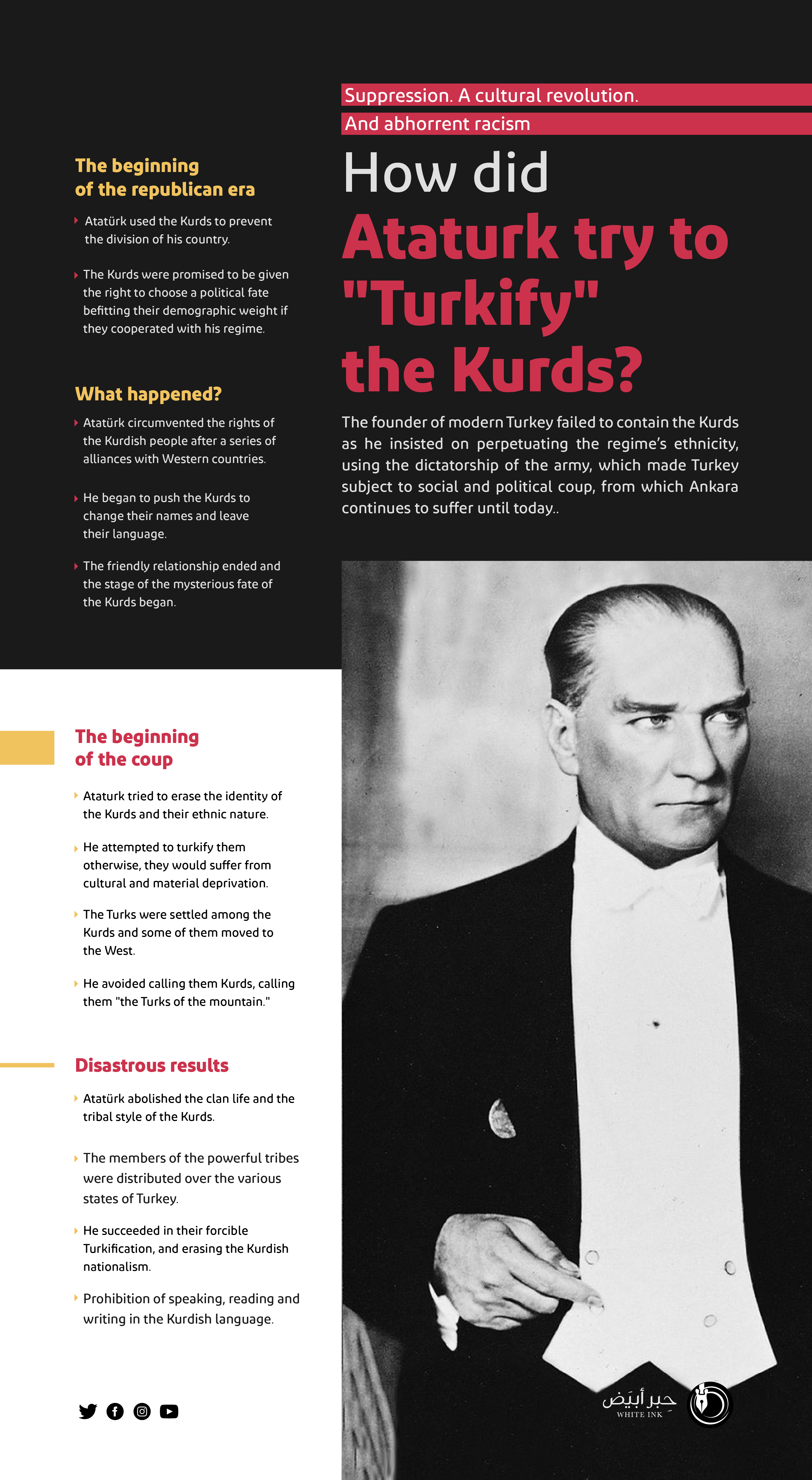

The story of having the Kurds under one banner to establish their Empire
The Turkish-Republicans weakened (Piran) only by Betrayal
The revolution of Sheikh Saeed Piran is the major revolution took place during the establishment of the modern Turkish Empire during the era of its founder Mustafa Kemal Atatürk. Sheikh Piran’s efforts started from the principle of establishing associations and organizations against the Ottomans, while the Kurdish revolution and its organizations in general came during the period (1908-1923).
Piran gathered the Kurds to recover the Kurdish right, as he worked to resolve the differences between the Kurdish clans, remove hostility and call for unity and agreement, to confront Turkish violations, and worked to communicate with the Turks inside Anatolia, as the leader of his people, but the Turkish detachments were lurking for any attempts to thwart them.
In early February (1925), the revolution broke out, witnessing the liberation of all areas of the fronts and the formation of the Kurdish government there, except for the city of Amed, where it was besieged for more than 50 days and the revolutionaries were unable to liberate it due to the unbreachable wall of the city and the heavy artillery fire on the revolutionaries, in addition to the number of defenders that reached more than 30,000 soldiers from the Seventh Legion besieged in the city.
One of the important revolutionary actions carried out by Saeed Piran at the time, was the Kurds taking full control of the province of Kingo, and the governor and the Turkish employees were captured, and an exceptional law was issued, bearing the signature of Sheikh Saeed, stipulating that Kingo would be the temporary capital of Kurdistan. The religious and civil authority passed to the Sheikh Saeed, and all taxes and captives were sent to Kingo. The Kurds also issued an appeal announcing the abolition of the tithe tax, and instead called on the inhabitants to provide provisions to the revolutionaries; So then, the Turkish Council of Ministers declared, in an emergency session, a state of emergency, and placed it under martial law, for a full month, so that the Turkish army could resist the Kurds.
The Turkish-Republicans destroyed the Kurdish villages and robbed the houses of the innocents.

The Turkish army arrested the leader of the revolution, Piran, along with a number of members of the leadership committee on the Varto bridge at night, on the Euphrates, after the betrayal of a person who was supposed to guide the convoy.
The betrayal coexisted with the entry of three battalions of the Turkish army, in addition to 150,000 Kurdish traitors to Piran, to the battlefield, especially on the Diyarbakir front, where the intensity of the fighting had tremendously intensified; thus, this news caused the collapse of the Kurdish resistance for the dream of the state of Kurdistan.
In mid 1925s, the death sentence was issued against the 49 leaders of the revolution, including Saeed Piran, and they were executed by hanging in the mountain gate square, in the city of Amed, and the gallows platforms were placed in one line, after they were led to military courts known as “Independence Courts”. Before Piran was executed, General Mersal, commander of the Sixth Legion in Diyarbakir, asked him if he has a will to make. Piran replied with a question: Do the enemies implement the will of their victims? While one of the Sheikh’s statements during his trial was: “You do not recognize our political rights. Why do you talk in the name of the religion?”
Saeed Piran revolution ended with the killing of 15 thousand and having its leader strangled.

The brutality of the Turkish massacres against the Kurds continued until “Ramadan”, after that, in early February (1928), and one of the most brutal actions of the Atatürk government was burning more than 600 villages and the forced displacement of more than 700,000 Kurdish revolutionaries and militants. This reach families, without considering any human impact, into Anatolia to separate them and break up their demographic composition from all sides, the most important of which is the religious, linguistic and cultural identity, so that the suffering of the Kurds inside Turkey continues to this day.


- Sabreya Ahmed Lafee, The Kurds in Turkey, a political study of the armed Kurdish movements (Baghdad: Mustansiriyah university, 1985).
- Muhammad Mukhtar Pasha, inspiring in combinations compared to Hijri dates in years, Coptic Alavrinkeh (Cairo: ARAB INSTITUTE FOR RESEARCH & PUBLISHING, 1980).
- Mohamed Noureddine: Turkey in time shifting, concerns identity options conflict (Amman: without publisher, 1997).
- Nawal Abdul-Jabbar Al-Tai, “Turkish political changes towards the Kurdish problem 1999-2006”, Journal of Regional Studies, University of Mosul, Fourth Year, No. 7 (2007).
- hushank ossi, “The Historical Roots of the Kurdish Issue”, Research of the Egyptian Institute for Studies, Cairo (2017).

Started by Piran and led by Abdullah Ocalan
The Story of Founding Kurdistan Workers’ Party And The Turkish Torture Procession
Kurdistan Worker’s Party (PKK) did not represent a struggle movement aimed at obtaining independence only, but it was a unique humanitarian movement in modern human history to restore the life of a people that has been deprived of freedom for long centuries. That was the advantage that has been stolen by Ottomans and those new Turks who came after them. They transformed an authentic people that was one of the most important region elements to a mere human element that was at the mercy of the temper of politicians who deprived Kurds from their original language, national anthems, traditional clothing, and their land upon which they were born and lived for thousands of years.
The relationship between Kurds and Ottomans has been through a long way called Great Deception. Kurds viewed Turks as potential allies, while Ottomans dealt with them only as temporary allies who would be slaves in the future. Although Kurds played a strategic role in favor of Seljuk Turks during their war against Byzantines and Safavids until after World War I. However, this did not excuse Kurds in face of the selfishness of Ottomans.
Since 1515, when Ottoman Selim I concluded his agreement with Kurdish princes, he recognized the sovereignty of the Emirates over Kurdistan; the survival of hereditary rule therein; and the support of Astana to it in case of invasion or attack, in return, Kurdish Emirates shall pay annual fees as an indication of its subordination to the Ottoman Empire. However, four decades later, Ottomans revoked their agreement and concluded another agreement in Amasya when Kurdistan was divided between them and Safavids. This has caused the outbreak of several revolutions throughout Ottoman history by Kurds. They extended to the beginning of the era of Turkish Republic. The most prominent of which was the revolution of Sheikh Said Piran. It was buried early; then, it became the cradle of the revolution of Abdullah Ocalan 50 years later.
The movement of Abdullah Ocalan and his friends who were students came at the beginning of the seventies of the last century. It was a reaction to the Turkish Oppression machine which trampled their lands; and violated their language, and heritage. It made them mere refugees in their lands, especially after the expansion of Turkish racism across all remaining regions following the fall of Ottoman Sultanate. Kurds had to restore the legitimate dream of their revolution, which Turks tried to bury by executing Sheikh Said Piran, the leader of their first revolution. Therefore, emerge of PKK which was on 27 November (1978) was a natural and expected reaction, despite of its long delay.
The party was founded by Ocalan in (1978), and he was arrested in (1999).

The foundation was in line with the leftward extension in the world from Cuba to Vietnam, when a group of Marxist students who were not known in the Kurdish political arena, including the young Abdullah Ocalan who was later chosen as the chairman of the party that, in the beginning, adopted Marxist ideology. Nevertheless, it did not deviate from its national goals, at all, desired by every Kurd, which was the establishment of the Great Independent Kurdistan. Syrian researcher and writer, Abdulbasit Sida, described the PKK as pragmatic. He is accurate in this regard to a large extent. In light of the occupation of most Kurdish lands, any struggle movement had to carefully deal with its surrounding forces in order to ensure continuity and achievement of the final goals.
Sida, the writer, talked about this stating that: “the observer of policies and practices of Kurdistan Workers’ Party (PKK), since its formation in 1978 till today, is aware that it has adopted from the beginning four basic rules, which have not been abandoned so far. Moreover, regional conditions that helped it has allowed it more space to move and to continue its struggle movement”.
The results of Ocalan organization had disastrous consequences as Turkish killing machine started to claim Kurdish lives, as it did with Armenians, as they were victims of one killer. More than 40 thousand Kurds died since the outbreak of conflict between the two parties which reached its peak in the mid- nineties of the last century. Thousands of Kurdish villages in southeastern and eastern Turkey were destroyed, forcing hundreds of thousands of Kurds to flee to other parts of Turkey.
There is no specific date for the beginning of organized armed Kurdish activities. However, the announcement of PKK led by Ocalan of the strategy of armed struggle in (1984) was considered an important indicator in this direction. Armed confrontations between government forces and PKK elements continued until the late nineties. The party leader, Abdullah Ocalan, was arrested in February (1999). Thus, a new phase of the organization has started.
Successive Turkish governments tried to deal with the Kurdish issue through a series of procedures of a mostly security nature. There were also some useless economic solutions. The decision of Turkish government to give priority to military resolution was a cause to complicate the economic problems, and increase military spending. (Al- Ghab) project of developing the southeast region of Anatolia was hampered a lot. In addition, as mentioned by Kawthar Al-Rubaie, in his publication under the name of Turkey and Kurdish issue (Torkia W Al- mas’la Al- Kurdia), the economic solution was not the desired solution. He highlighted Kurdish demands and obtainment of some sympathy. Nevertheless, solution approaches remained weak as all governments denied that Kurds were one nationalism. They continued to ensure that all those who were residing in Turkey were Turks, and they called Kurds Turks of the mountains.
The Kurds pursued all efforts to get rid of Turkish tyranny.

PKK started its military activity since its foundation but it significantly escalated subsequent to the Turkish reaction that had an attitude which was closer to liquidation since (1980). This prompted Kurds to flee from their lands and seek refuge to Iraqi Kurdistan and make it a protection zone for their rear bases. They have also created an alliance with Iraqi- Kurdish clans.
At the end of the nineties, Abdullah Ocalan moved to Syria and started managing his organization over there. At that time, the first conference of PKK has been held in Syria in mid- July in (1981). After that, PKK left Syria and settled in northern Iraq, then, it came back again in (1984) towards Syria, from which it began launching armed operations against Turkish military goals, especially in the cities of Hakkari, Mardin, and Sirte, as its first armed operation was in Hakkari. Meanwhile, the armed operations launched by the party against government buildings and Turkish military goals continued. Turkish government declared a state of emergency in (1987). During this period, the organization implemented incursions into a number of villages in eastern Turkey.
Turkey had to make a deal with Israeli Mossad in order to kidnap Abdullah Ocalan. Consequently, the party had a finishing stroke in (1999) when its leader was arrested and prisoned in Turkey on charges of treason. In his book “The Secret History of The Mossad”, Jordon Thomas, writer, told complicated details of the kidnapping story of the PKK leader for which he devoted a special chapter and tried to trace it between several capitals. He stated that, “the Prime Minister of Turkey, Bulent Ecevit, sought help from Israeli Prime Minister, at that time, Benjamin Netanyahu, to arrest Ocalan who caused troubles to Turkish authorities. He moved worldwide from Beirut, Germany, Italy, to Moscow. He was able to hide so that Turkish intelligence was not able to arrest him”.
Thomas, the writer, continued his story stating that, “Mossad office in Italian capital, Rome, had a pivotal role tracking Ocalan. It received information that he was heading from Netherlands to Kenyan capital, Nairobi, by a private plane to escape pursuit. The information was sent to Mossad office in Nairobi in order to monitor the arrival of Ocalan who immediately, upon his arrival, sought refuge to Greece embassy. His movement was monitored until he decided to leave Kenya informing his companions that he was going to Netherlands again. Israeli intelligence told the information to Turks who, in turn, quickly prepared an alternative plane, in which the last chapter of the long and exciting story took place by arresting him. He was imprisoned for life in Imrali Island in the Sea of Marmara after he had been brought before court and sentenced to death on the charge of “high treason”. After that, the sentence was commuted to “life” imprisonment after abolishing the death sentence under the twinning laws with the European Union.


- Hana Ezzo, “The PKK issue and its implications for Iraqi- Turkish relationships” (Kadiat Hizp Al- Omal Al- Kurdistani W Inekasitiha Ala Al- Alelakat Al- Iraqia A;- Turkia), Regional Studies Center, University of Mosul (2012).
- Mohammed Al- Saed, “The night of Kidnapping Abdullah Ocalan” (Lailat Ikhtitaf Abdullah Ocalan), Okaz Newspaper, Saudi Arabia (2018).
- Kawthar Al-Rubaie, “Turkey and Kurdish issue”, The International Political Journal, Center for Strategic and International Studies, University of Baghdad (2019).


